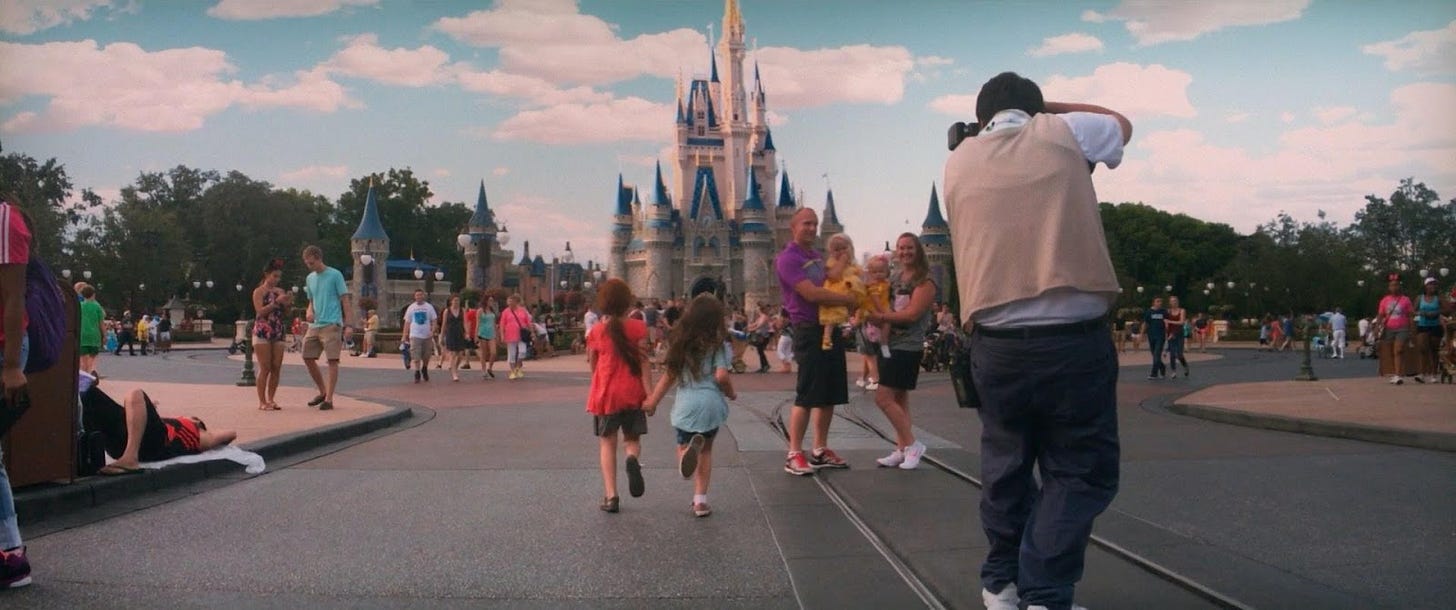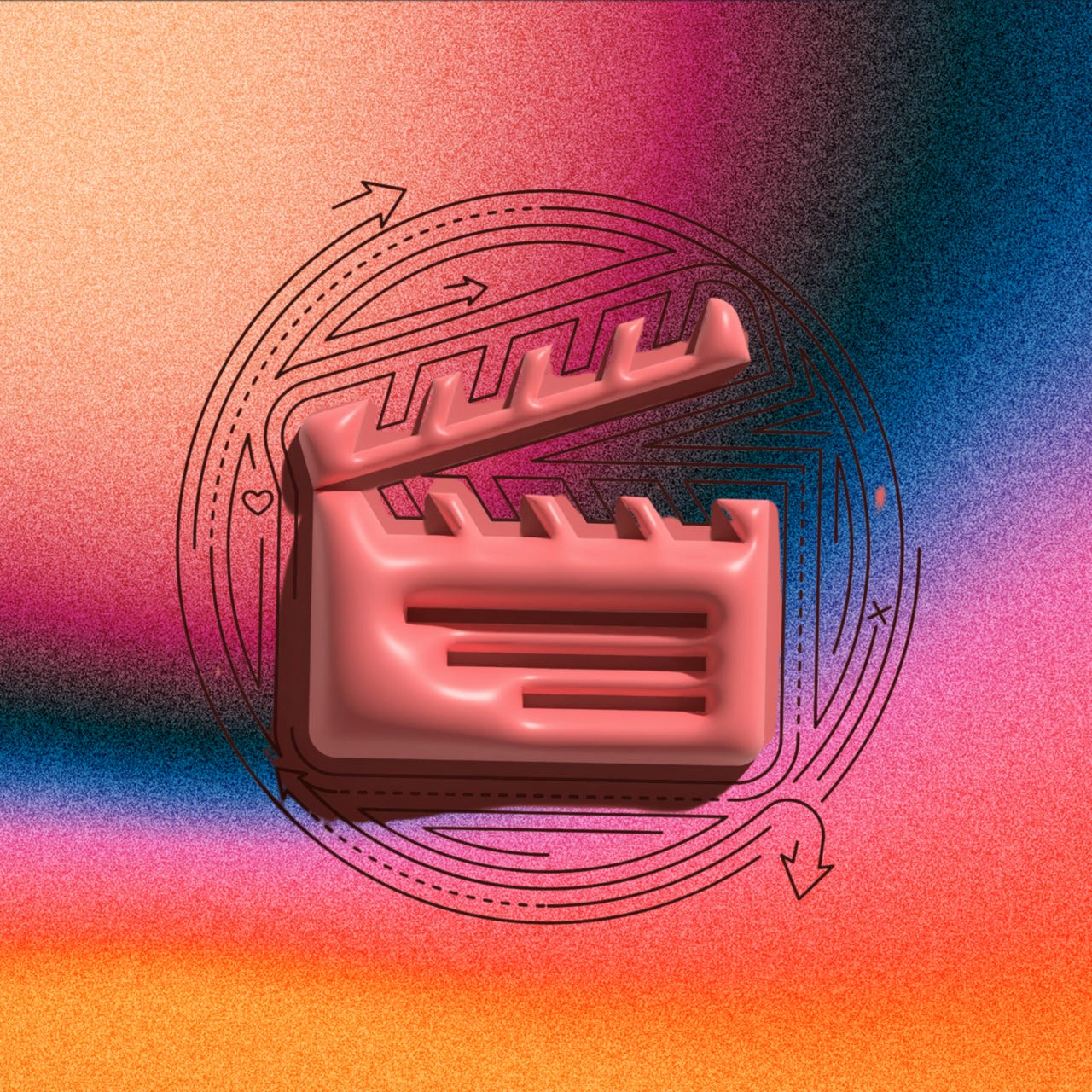Parked at the Magic Castle: The Florida Project's Shattered Ending
Nonfiction by Sophie: That Final Scene
This piece is part of The Lot, the first volume of SUM FLUX. Featured in Edition II, this work is one of eight contributions to this edition. Read more about this zine and its theme here: https://sumflux.substack.com/p/volume-1-the-lot.
A five-year-old brain processes trauma in fragments. The sound of metal crushing metal. The way adults stop talking when you enter a room. The whispered word "accident" floating through your grandmother's kitchen. My aunt died in her car on a Tuesday, and I've spent two decades avoiding the driver's seat of any vehicle since. The thought of gripping a steering wheel makes my hands shake. Trauma writes itself into your muscle memory. But parking lots?
Parking lots feel safe. Cars sleeping in their painted rectangles can't hurt anyone. I spend hours studying final scenes in films, dissecting how stories end, and parking lots keep showing up like persistent ghosts in the frame.
In the final scene of Sean Baker's The Florida Project (2017), childhood poverty wears purple paint and palm trees. The Magic Castle Inn—Baker’s central shooting location in the film – squats six miles from Disney World, a last-resort motel where $35 a night buys you a room with a microwave and a view of life on the edges in “Tourist Trap America.” Here, six-year-old Moonee lives with her mother Halley, a former stripper scraping together rent money through increasingly dangerous choices. The film could have easily descended into poverty porn, another grim tableau of American despair. Instead, Baker presents this world through Moonee's defiant eyes, transforming even the drab expanse of a budget motel parking lot into a vibrant kingdom.
This is what poverty does to children: it forces them to alchemize the trash they’ve been given into gold. To make playgrounds from purgatory. We watch Moonee and her “motel kid gang” turn their contained world into adventure: spitting contests on windshields, scamming tourists for ice cream money, racing through the spaces between parked cars playing games they invented because they couldn't afford real ones . . .
The parking lot at The Magic Castle Inn becomes their stage, their escape hatch, their whole universe compressed into painted rectangles of asphalt. When child services arrive to take Moonee away from her struggling single mother Halley, the parking lot transforms into something else entirely. It's no longer just the playground of her imagination: it becomes the last barrier between her childhood, and its abrupt and dramatic end.
Every car she weaves between is another second she gets to hold onto who she is. Every painted line she crosses is another moment before her world shatters. The lot that once contained her whole universe is now the centrepoint in her final desperate attempt to outrun reality itself.
Baker captures this metamorphosis in the film's most artistically captivating choice: as Moonee, and her best friend Jancey, flee across the familiar asphalt, the very texture of reality seems to crack and the film’s stock changes from 35mm to iPhone footage, a visual rupture signaling the fracturing of Moonee’s world. Each car she weaves between represents another second she clings to herself. Each painted line she crosses marks one more step toward a world she can’t stop from shattering. The concrete maze of the parking lot dissolves into Disney World's manufactured fantasy.
Are they really there, lost in a sea of tourists? Or has trauma finally fractured Moonee's carefully constructed world? The shift in film stock amplifies the uncertainty, making it impossible to know if this is Moonee's escape or her final surrender. The parking lot marks the exact moment everything breaks - where reality splits open and swallows itself. It's the last place Moonee exists as herself before either escaping into complete fantasy or being swallowed by the system. This is why Baker sets Moonee's final break from reality here: parking lots hold America's inconvenient truths, hiding its displaced people in plain sight.
There's a sick poetry to these vast concrete planes are America's waiting rooms - spaces we built to hold our cars while we chase something better inside. But for kids like Moonee, parking lots aren't waiting rooms: they're permanent addresses. The Magic Castle's lot maps an entire childhood of displacement - each parking space marking another family living on society's margins, each oil stain a story of someone who couldn't afford to fix their transmission, each empty spot another eviction. It's no accident that Baker sets Moonee's final break from reality here. Parking lots are where America stashes its inconvenient truths, its broken promises, its displaced people. They're the physical manifestation of our collective limbo.
Moonee's feet know this lot like a dance. Every path between bumpers, every shortcut behind vans that haven't moved since winter, every shadow that makes a good hiding spot. For motel kids, parking lots mutate beyond playgrounds into something darker: escape routes, early warning systems, the first place you learn to read danger in a strange car's too-slow circle or a cop car's idle. By six, Moonee's body has memorized every possible path through this maze because it had to. The parking lot burned this lesson into her bones: survival means always knowing your exits.
This is what parking lots do in our darkest moments - they hold space between what was and what comes next. Between the life you're leaving and the one you're forced to enter. Between reality and the stories we tell ourselves to survive it. A six-year-old girl learns this by running through a maze of parked cars. For me, parking lots meant safety, a place to park my own trauma neatly away. For Moonee, they became survival itself. A five-year-old learns it in their grandmother's kitchen, yet we keep returning to these paved rectangles, these liminal spaces where even shattered things can rest. Where trauma parks itself in neat white lines, waiting to be reclaimed.








Thank you for sharing 💖💖💖
I enjoyed this even more after re-watching the film's end. What an incredible ending and your use of this film for this vine was so clever and unique and adds such a nice touch to the overall vine. Thank you for this. I def gonna check out way more of your reviews now.